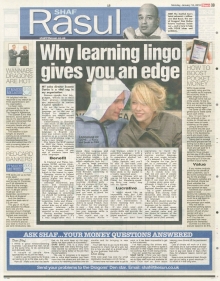My sales director Susana Garcia is a vital cog in my organisation.
Susana speaks four languages, which is a skill that always impresses me, especially in native English speakers.
It’s not the norm for us Brits to have another language yet in the rest of Europe it’s essential – students are taught second and third languages from school age.
Unfortunately in Scotland – and much of the English-speaking world – we have a lazy attitude to languages.
The international business language is English and most pop culture stems from America so as a nation there is no overwhelming urge to learn a new tongue.
The figure the SNP quoted in 2003 for Scots students taking a Higher in languages was nine per cent, compared to Finland where 99 per cent of students learn two other languages.
In England and Wales, languages GCSE entries plummeted by more than a third over the last seven years to just 362,500 last summer, which is the lowest in years.
However, across in Ireland around 30 per cent of those taking higher are doing a foreign language.
Although Hollywood, pop music and international diplomacy are generally English-driven, the world is developing in such a way that language is something we should be tackling early.
Look at the emerging markets and we have Brazil, Argentina, India and China.
By the time our primary school kids are of adult age, economic relations with these new powers will be essential to our survival.
Having another language can open many doors – it’s a very sought-after skill. I speak three languages and am very impressed by potential employees who have mastered another tongue – it is a viable and profitable skill which employers look for.
If you’ve been watching Celebrity Big Brother this year you’ll have heard Russian Katia and Jonas, from Sweden, conversing in perfect English.
For other countries it’s the norm, so why not us? We should be stepping up and teaching children early – kids are sponges at that age.
But it’s not only for the next generation – in a recession the job market is tight and you need to stand out from the crowd.
If you go for an interview and are evenly matched with a competitor aside from your ability to speak French, then the choice for the employer is easy – they look at the potential and how they can use your language skills to benefit their business.
You could end up in France, Canada, Africa – even Vietnam where it is a secondary language – with a great salary and getting paid to experience another culture and way of life.
Learn Spanish and you’ll be able to fast-track your career in business as we start to deal more and more with South America. Bringing these skills to the market is a highly respected asset.
Learning Chinese will set you up for life as salaries in China for Mandarin-speaking Brits can easily leap into six figures.
It might sound like an impossible task but 3,469 pupils took a GCSE in Mandarin or Cantonese last year and the Government is slowly realising how lucrative a skill it is.
If you start your own company, having extra linguistic skills can provide the platform to expand into new global markets.
Even if you don’t have aspirations to travel the world, a call centre job that requires another language will see your wages increase as it’s deemed a ‘skilled job’.
Or imagine the tips you’d get in a restaurant if you spoke to diners in their own language, not yours, as we Brits have a tendency to do.
As it stands now, less than ten per cent of people in Scotland speak another language fluently but the doors it can open are many.
It makes great sense and – although it might be a struggle – the personal and professional benefits are huge.
I’m a great advocate of catching kids during their education and letting their sponge-like brains soak up a new language.
But adults should know the rewards from learning another language can be massive.
It could take your career in a new direction, boost your market value and let you thrive in corners of the world where you never thought you’d find yourself.
| Related Content Video: Improve Your Logical Reasoning Skills |

